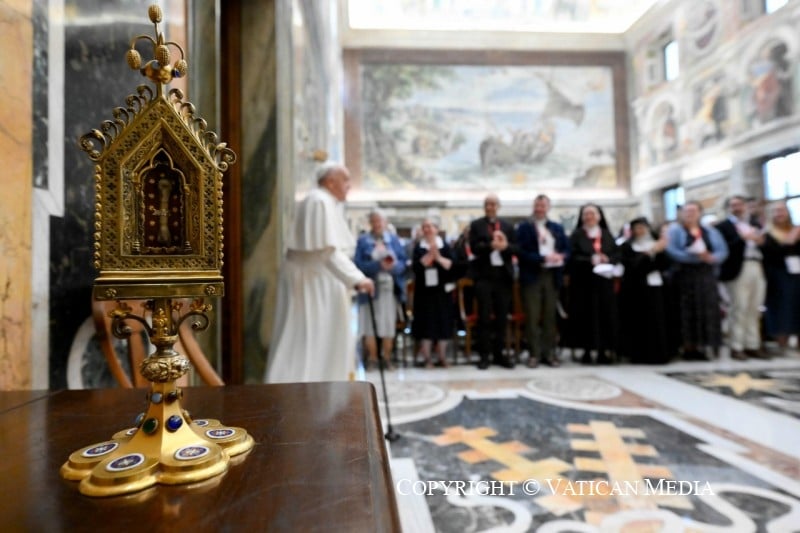This morning, in the Vatican Apostolic Palace, the Holy Father Francis received in audience the participants in the conference “Repairing the irreparable” on the 350th anniversary of the apparitions of Jesus to Santa Margherita Maria in Paray-le-Monial.
In his words, Pope Francis underlined that he prays that his Jubilee of the Sacred Heart may inspire in many pilgrims a greater love of gratitude towards Jesus, a greater affection; and that the sanctuary of Paray-le-Monial: be a sanctuary where there is comfort and mercy for the soul seeking inner peace.
We publish below the speech that the Pope addressed to those present at the Audience:
Speech by the Holy Father
Dear brothers and sisters!
I am pleased to welcome you, and I warmly welcome you. I thank Msgr. Benoit Rivière and Fr. Louis Dupont for having taken the initiative of this meeting, in the context of the celebration of the 350th anniversary of the apparitions of Jesus to Saint Margaret Mary.
Reparation is a concept we find often in the Sacred Scriptures. In the Old Testament, it takes on a social dimension of compensation for evil committed. This is the case for the Mosaic law that provides for the restitution of what had been stolen, or the reparation of the damage caused (cf. Ex 22:1-15; Lev 6:1-7). It was an act of justice aimed at safeguarding social life. In the New Testament, however, it takes the form of a spiritual process, within the framework of the redemption brought about by Christ. Reparation is fully manifested in the sacrifice of the Cross. The novelty here is that it reveals the Lord’s mercy towards the sinner. Reparation therefore contributes to the reconciliation of men between themselves, but also to reconciliation with God, because the wrong done to our neighbour is also an offence to God. As Ben Sirac the Wise says, “Do not the tears of the widow fall on the face of God?” (cf. Sir 35:18). Dear friends, how many tears still flow on the face of God, while our world experience so much abuse against the dignity of the person, even within the People of God!

Reparation, to be Christian, to touch the heart of the offended person and not to be a simple act of commutative justice, presupposes two demanding attitudes: recognizing oneself as guilty and asking for forgiveness.
Rrecognizing oneself as guilty. Any reparation, human or spiritual, begins with acknowledgment of one’s own sin. “Self-accusation is part of Christian wisdom; this pleases the Lord, because the Lord welcomes the contrite heart” (Homily at Mass at Santa Marta, 6 March 2018). It is from this honest acknowledgment of the wrong done to one’s brother or sisters, and from the profound and sincere sentiment that love has been harmed, that the desire to make amends arises.
Asking for forgiveness. It is the confession of evil committed, following the example of the prodigal son who says to the Father: “I have sinned against heaven and before you; I am no longer worthy to be called your son” (Lk 15:21). Asking for forgiveness reopens dialogue and manifests the will to re-establish the bond of fraternal charity. And reparation – even a beginning of reparation or simply the will to make amends – guarantees the authenticity of the request for forgiveness, it expresses its depth, its sincerity, it touches the heart of the brother, consoling him and inspiring in him acceptance of the forgiveness requested. Therefore, if the irreparable cannot be completely repaired, love can always be reborn, making the wound bearable.
Jesus asked Saint Margaret Mary acts of reparation for the offences caused by the sins of humanity. If these acts consoled His heart, this means that reparation can also console the heart of every wounded person. May the work of your conference renew and deepen the meaning of this beautiful practice of the reparation of the Sacred Heart of Jesus, a practice that today may be somewhat forgotten or wrongly judged obsolete. And may it also help to enhance its rightful place in the penitential journey of each baptized person in the Church.

I pray that your Jubilee of the Sacred Heart may awaken in many pilgrims a greater love of gratitude to Jesus, a greater affection; and that the shrine of Paray-le-Monial may always be a place of consolation and mercy for every person in search of inner peace. I give you my Blessing. And I ask you, please, to pray for me. Thank you!
__________________________________
Holy See Press Office Bulletin, 4 May 2024










